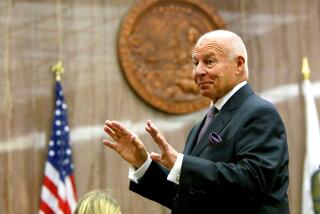SEC Reconsiders Rules for Lawyers
- Share via
The Securities and Exchange Commission will drop a proposal forcing lawyers to report corporate fraud suspicions to the government after Fidelity Investments and the American Bar Assn. said the rule would violate attorney-client confidentiality.
The SEC will remove the proposal from consideration when it votes Thursday on rules mandated by Congress in July that would require lawyers to report misconduct by their corporate clients to the board of directors and top executives, SEC officials said.
The decision is a setback for efforts by outgoing SEC Chairman Harvey L. Pitt to expand investor-protection legislation passed by Congress in reaction to scandals at Enron Corp. and other companies. Pitt added the requirement that lawyers must inform the SEC if management or board members don’t address its concerns. That could discourage companies from seeking legal advice, opponents of the rule said.
“Anytime you create this kind of obligation, you will create a disincentive for executives to be candid,” said Stephen Gillers, an ethics expert at New York University School of Law.
The SEC will seek further comment on the rule before deciding whether to vote on it later.
“It would be an extremely wise decision because a proposal as obtrusive, controversial and far-reaching as this should have as much time for public comment as possible,” said Joseph McLaughlin, a New York lawyer who is on the American Bar Assn.’s panel on federal securities regulation.
The proposal, which the SEC issued in November for 30 days of public comment, also drew opposition from the European Union, Charles Schwab Corp. and J.P. Morgan Chase & Co. Some experts said the SEC had gone beyond the mandate of Congress, which passed the Sarbanes-Oxley corporate governance law in July.
SEC spokesman John Heine declined to comment Tuesday.
One of the comment letters supporting the proposal came from a group of law professors led by Susan Koniak of Boston University.
“If the recent scandals and those of the past have taught us anything, it is that the boards of some companies are either kept in the dark by management or are reluctant to oppose management actions that are or may be illegal,” the academics wrote.
In reaction to Enron’s bankruptcy filing in December 2001, shareholders sued the company’s law firm, Vinson & Elkins. An Enron board committee said the Houston law firm should have urged company executives to disclose more about off-the-books partnerships that hid about $1 billion in company losses. Vinson & Elkins has denied misconduct.
The firm had conducted an internal investigation of employee complaints that accounting rules were violated. The lawyers didn’t report their findings to anyone outside the company.
Pitt submitted his resignation in November, agreeing to remain on the five-member commission until a successor is named. President Bush has nominated William Donaldson to succeed Pitt, but the Senate Banking Committee has not set a date for Donaldson’s confirmation hearing.
More to Read
Inside the business of entertainment
The Wide Shot brings you news, analysis and insights on everything from streaming wars to production — and what it all means for the future.
You may occasionally receive promotional content from the Los Angeles Times.










